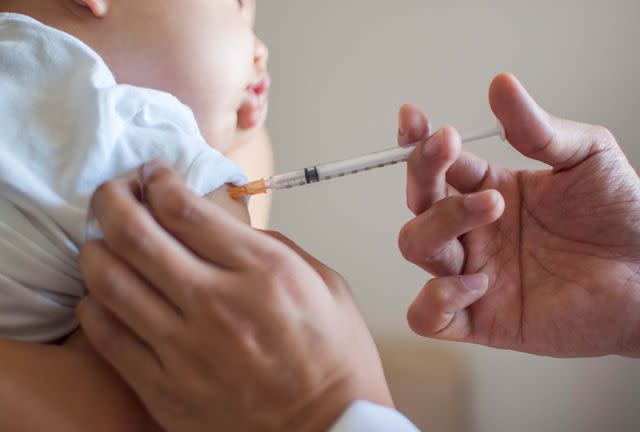Autism in Vaccinated and Unvaccinated Children
There's no link between vaccines and autism
Medically reviewed by Isaac O. Opole, MD, PhD
Despite there being no evidence showing a link between vaccines and autism, conspiracy theories about the connection persist. Vaccinated children develop autism at the same rate as unvaccinated children.
Avoiding vaccines because of the persisting myth that they cause autism is dangerous. While it won't prevent a child from developing autism, it also means the child won't be protected from vaccine-preventable diseases that can challenge their health and be spread to others.
This article will discuss the research supporting the fact that vaccines do not cause autism. It will also cover the rates of autism in unvaccinated and vaccinated children.

Karl Tapales / Getty Images
No Link Between Vaccines and Autism
A study by Andrew Wakefield, which has been retracted, started the debate about a link between vaccines and autism. Mr. Wakefield's medical license has since been revoked due to dishonest and irresponsible conduct.
The fact is that vaccines do not cause autism. This statement is supported by vast research and evidence.
A 2022 review of 19 peer-reviewed studies conducted by various researchers on human subjects showed no link between vaccines and autism spectrum disorder (ASD). The cause of autism has been studied extensively for decades.
While studies point to a combination of genetics and environmental factors leading to ASD diagnoses, it is clear to scientists that vaccines do not cause autism.
Takeaway
Researchers found no evidence linking the MMR vaccine to autism, even in the children who had an increased risk for the disorder.
Newer research is pointing to a genetic basis for autism and suggests that autism might be present even before birth.
Related: Want to Talk About Vaccines With a Loved One? Practice Using Our Virtual Conversation Coach
Unvaccinated Autistic Children
Numerous studies have been done comparing autism rates between vaccinated and unvaccinated children. No difference has been found.
One study from Japan looked at the MMR vaccine, which was withdrawn from the country due to concerns about aseptic meningitis. In that study, a statistically significant number of children were found to have developed autism even though they had not received the MMR vaccine.
Another study published in the February 2014 issue of the journal Autism found "the rates of autism spectrum disorder diagnosis did not differ between immunized and non-immunized younger sib groups."
One 2018 study reported in JAMA Pediatrics aimed to determine vaccination patterns of children with and without autism and their younger siblings. The researchers determined that autistic children and their younger siblings had higher rates of being un- or under-vaccinated.
Takeaway
Research suggests that autistic children (and their siblings) may be at higher risk for vaccine-preventable diseases because of vaccine avoidance. While there is no proven benefit of avoiding vaccines in terms of autism prevention, this research highlights a proven danger of doing so.
What Do We Know About the Causes of Autism?
While scientists now understand that vaccines do not cause autism, it is difficult to pinpoint just one or two factors that lead to autism. However, it is now understood that genetic and environmental factors are likely critical components leading to the development of autism spectrum disorders.
Researchers have found that autistic people have genetic changes or variations that, together with environmental factors, lead to autism. One gene in particular, the MET gene, is thought to have a role in autism.
Some environmental factors that may contribute to the development of autism include:
Older parents
Low birth weight
Premature birth
Exposure to pollutants or certain heavy metals before birth
Maternal metabolic disease
More research continues to investigate genetic and environmental factors that lead to autism.
Summary
Studies have shown there is no significant difference in rates of autism among vaccinated and unvaccinated children. Because vaccines have been shown repeatedly not to lead to autism, choosing not to vaccinate puts children at risk of developing unnecessary illnesses or exposing others who might be ineligible for vaccines.
Read the original article on Verywell Health.

